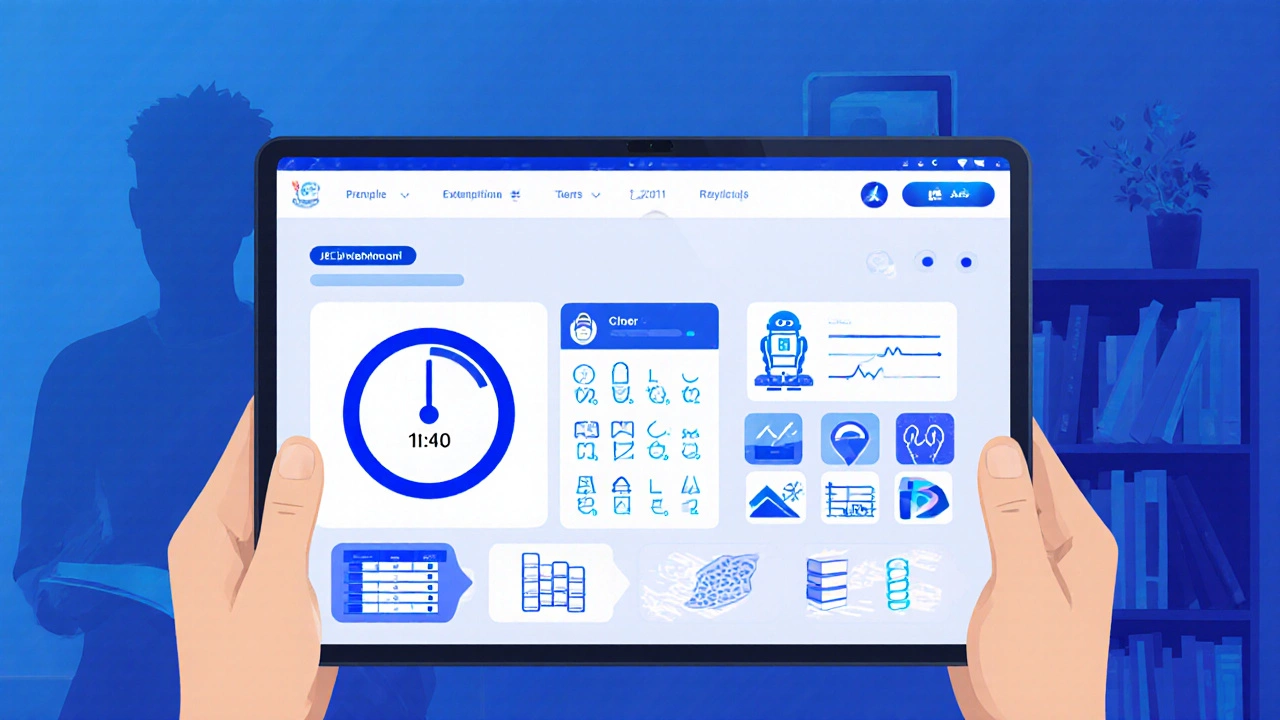
JEE Self-Study Cost Calculator
Calculate Your Savings
Compare the cost of coaching versus self-study for JEE preparation. See how much you could save by studying independently.
Your Savings Analysis
Total Coaching Cost
Total Self-Study Cost
Total Savings
When you hear people talk about JEE (India's Joint Entrance Examination for IIT admission), the first thing that pops into most minds is a bustling classroom full of teachers, batchmates, and endless practice sheets. The same image often includes Coaching Institutes (private centers that offer structured JEE courses). But what if you don’t have the budget, the time, or even the desire to enroll in a pricey coaching program? Can you still crack JEE on your own? The short answer is yes, but it requires a disciplined plan, the right resources, and a clear understanding of what coaching actually provides.
What the JEE Landscape Looks Like in 2025
The JEE exam has two stages: JEE Main and JEE Advanced. JEE Main serves as a qualifier for both NITs and the Advanced exam, while JEE Advanced decides who gets into the IITs. In 2025, the syllabus stays anchored to NCERT Class 11‑12 physics, chemistry, and mathematics, but the question patterns have become more conceptual, with a heavier emphasis on problem‑solving speed.
Key changes that affect self‑study candidates include:
- Online test‑taking is now the norm; most mock tests are delivered via platforms like Embibe and BYJU'S.
- AI‑driven doubt‑clearing apps (e.g., Toppr, Vedantu) provide instant explanations.
- Previous year papers are freely available on the official NTA portal.
Understanding these shifts helps you pick tools that mimic the real exam environment without stepping into a classroom.
What Coaching Institutes Actually Deliver
Coaching centers boast three major benefits:
- Structured curriculum: A week‑by‑week roadmap that aligns with the JEE syllabus.
- Experienced faculty: Teachers who have cleared JEE themselves and know the typical traps.
- Peer pressure: A competitive atmosphere that can push you to study longer hours.
They also provide regular mock tests, performance analytics, and occasional doubt‑clearing sessions. However, these services come at a cost-often between INR 80,000 and INR 1,50,000 per year-and they may not suit every learning style.
Building a Self‑Study Engine That Works
If you decide to go solo, think of yourself as both the student and the coach. Your engine needs three core components:
- Content source: The material you’ll actually read and practice.
- Schedule: A realistic timeline that spreads topics across the months left until the exam.
- Feedback loop: Frequent assessments to gauge where you stand.
When these three align, you can replicate most of the value a coaching institute offers-sometimes even better, because you can tailor everything to your own pace.
Essential Resources for Self‑Study
Below are the most reliable, cost‑effective resources you can tap into. Each has been vetted by top rankers in 2024‑2025.
- NCERT textbooks (Physics, Chemistry, Mathematics): The backbone of every JEE question. Solve all end‑of‑chapter exercises and then move to additional problems.
- Concept‑centric books: H.C. Verma (Concepts of Physics), O.P. Tandon (Chemistry), and MTG (Mathematics) are praised for clear explanations and varied difficulty.
- Online video platforms: YouTube channels like "Unacademy JEE" and "Kota Lectures" provide free Concept videos that match the NCERT flow.
- AI‑driven doubt‑clearing apps: Toppr and Vedantu’s chatbot features let you type a problem and get step‑by‑step solutions instantly.
- Previous year papers: Download the last 10 years of JEE Main and Advanced papers from the NTA website; they are the single best source of exam‑style practice.
- Mock test platforms: Embibe, Testbook, and CareerAnna offer timed tests with analytics on speed and accuracy.
- Online forums: Reddit’s r/jee and the Pagalguy community are great for tip‑sharing and finding study partners.
Designing a Study Plan That Sticks
Here’s a sample 9‑month plan for a student starting in January 2025. Adjust dates based on your own schedule.
- Months 1‑3 (Jan‑Mar): Deep dive into NCERT. Finish all concepts, solve Chapter‑end exercises, and create a one‑page summary for each topic.
- Months 4‑5 (Apr‑May): Start concept‑centric books. For each chapter, solve 15‑20 problems from Verma/Tandon/MTG. Flag doubts for later review.
- Month 6 (Jun): Begin timed practice. Take one JEE Main mock every week, review mistakes within 24 hours.
- Months 7‑8 (Jul‑Aug): Full‑length JEE Advanced mocks every 10 days. Analyze performance reports: identify weak topics and revisit those concepts.
- Month 9 (Sep‑Oct): Revision sprint. Use your one‑page summaries, redo all previously solved problems, and focus on speed drills.
Key tips while following the plan:
- Study in 45‑minute blocks with 5‑minute breaks; this cadence matches the brain’s attention span.
- Keep a "doubt notebook" and allocate 30 minutes daily to clear them via online forums or AI apps.
- Track daily hours and problem count in a Google Sheet; visibility keeps you honest.

Monitoring Progress and Using Mock Tests Effectively
Mock tests are more than practice; they’re your diagnostic tool. Follow this three‑step loop after each test:
- Score analysis: Note accuracy, time per question, and subject‑wise breakdown.
- Error classification: Categorize each mistake as Conceptual, Calculation, or Careless.
- Targeted revision: Spend the next 48 hours revisiting only the concepts that caused errors.
Over time you’ll see the percentage of Conceptual errors drop, which is the strongest predictor of a high rank.
Self‑Study vs Coaching: Quick Comparison
| Aspect | Self‑Study | Coaching |
|---|---|---|
| Cost | Low (mostly free resources) | High (₹80k‑₹150k) |
| Flexibility | Study anytime, anywhere | Fixed class timings |
| Structure | Self‑made schedule | Pre‑designed curriculum |
| Feedback | Depends on mock tests & forums | Instant teacher feedback |
| Peer Motivation | Online study groups optional | Classroom competition |
| Adaptability | Can change plan on the fly | Rigid syllabus pacing |
Notice that the biggest advantage of self‑study is cost and flexibility, while coaching shines in immediate feedback and peer pressure. Your choice should align with your personal discipline level and financial situation.
Common Pitfalls and Pro Tips for Solo JEE Aspirants
Pitfall 1 - Over‑relying on video lectures. Videos are great for first exposure, but you’ll retain far less if you don’t solve problems right after watching.
Pro tip: Adopt the “watch‑solve‑review” loop: watch 15 minutes, pause, attempt 3‑4 problems, then check solutions.
Pitfall 2 - Ignoring NCERT. Many self‑study students skip NCERT, thinking it’s too easy. In reality, ~60% of JEE questions are directly traceable to NCERT concepts.
Pro tip: Finish all NCERT exercises before moving to any reference book.
Pitfall 3 - Inconsistent mock testing. Without regular timed practice, you’ll struggle with the exam’s speed.
Pro tip: Schedule a mock every 7‑10 days; treat it as a real exam (no phone, strict timing).
Pitfall 4 - Neglecting mental health. Burnout kills performance.
Pro tip: Include 1‑hour “offline” activities each week-sports, music, or a walk-to reset your mind.
Final Thoughts: Is Cracking JEE Solo Realistic?
Yes, it is. Hundreds of top rankers in the past decade have cleared JEE without ever stepping into a coaching hall. The formula isn’t magic; it’s disciplined execution, right resources, and constant self‑assessment. If you’re ready to own your schedule, invest in the right books, and treat mock tests as daily checkpoints, you can definitely achieve a competitive score.

Do I need a coaching institute to clear JEE Advanced?
Coaching isn’t mandatory. Many students clear both JEE Main and Advanced by following a self‑study plan that includes NCERT, reference books, regular mock tests, and doubt‑clearing via online platforms. Success depends more on consistency than on the presence of a classroom.
How much time should I allocate daily for JEE preparation?
Aim for 4‑6 hours on weekdays and 6‑8 hours on weekends. Break study time into 45‑minute blocks with short breaks; this keeps focus high and reduces fatigue.
What are the best free resources for JEE self‑study?
Start with the NCERT textbooks, then use YouTube channels like Unacademy JEE, the official NTA portal for past papers, and free AI‑driven apps such as Toppr’s doubt‑solver. All of these are completely free.
How often should I take mock tests?
Begin with one mock per week during the first three months, then increase to two per week as the exam approaches. Treat each mock as a real test-strict timing, no interruptions.
What’s the biggest advantage of self‑study over coaching?
Flexibility and cost. You can adapt your schedule instantly and spend only on the resources you actually need, which can be a fraction of coaching fees.




